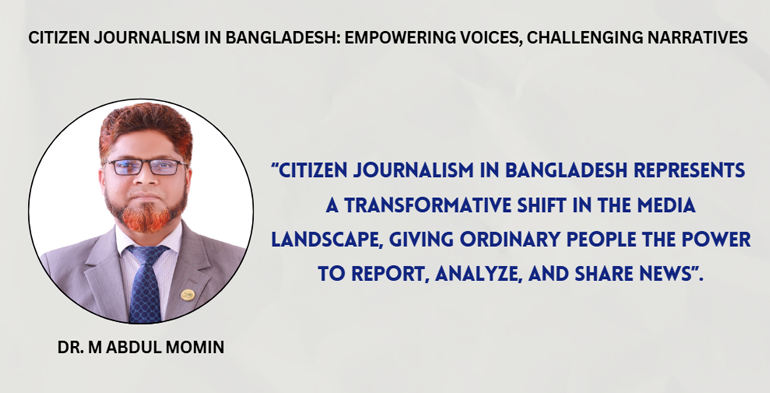
Dr. M Abdul Momin: In an era where digital connectivity is transforming media and information, citizen journalism has emerged as a powerful force in Bangladesh. It is redefining how news is reported, consumed, and discussed. With the rapid proliferation of smartphones, affordable internet access, and social media platforms, ordinary citizens are documenting events, exposing injustices, and amplifying marginalized voices. However, while citizen journalism has great potential, it also faces challenges related to credibility, ethics, and regulatory constraints.
If I focus on the rise of citizen journalism in Bangladesh, we can conclude that, Citizen journalism in Bangladesh has gained momentum over the past two decades, particularly with the advent of social media platforms like Facebook, YouTube, and Twitter. Traditional media, often constrained by political and corporate influences, sometimes fails to cover sensitive issues or provide a balanced perspective. This has created a space where independent voices can report on issues that mainstream media might overlook. Events such as the Recent Anti-Quota Movement in Bangladesh, Shahbagh Movement in 2013 and the student protests for safer roads in 2018 demonstrated the power of citizen journalism in mobilizing public opinion.
The Anti-Quota Movement in Bangladesh, which gained momentum in recent years, exemplifies the significant role of citizen journalism in shaping public discourse. The movement, led primarily by students and young professionals, demands the reform of the existing quota system in government jobs, which reserves a substantial percentage of positions for specific groups. Social media platforms have been instrumental in spreading awareness and mobilizing supporters. Live updates, videos, and personal testimonials have kept the movement alive despite restrictions on traditional media coverage. Citizen journalists have played a crucial role in exposing police brutality, administrative suppression, and misinformation related to the protests.
While the movement has garnered widespread support, it has also faced challenges, including government crackdowns, arrests, and digital surveillance. The Digital Security Act has been used to detain activists and journalists covering the protests, raising concerns about freedom of speech and press freedom in Bangladesh. Nevertheless, the Anti-Quota Movement has demonstrated the power of grassroots journalism in holding authorities accountable and advocating for systemic change.
Protesters and ordinary citizens used social media to share real-time updates, images, and videos, bypassing traditional media channels. Similarly, during natural disasters like floods in south districts citizen journalists provide crucial updates from affected areas, often before mainstream media can arrive.
The widespread availability of smartphones has revolutionized how information is shared. Platforms like Facebook Live, TikTok, and WhatsApp enable real-time broadcasting, allowing citizens to report incidents as they unfold. YouTube channels run by independent content creators have also gained popularity, offering in-depth analysis and alternative narratives on political, social, and economic issues. Bangladesh has over 130 million internet users, with a significant portion accessing social media. This digital connectivity has facilitated an ecosystem where grassroots reporting thrives.
Citizen journalism provides perspectives that mainstream media may ignore due to political or commercial pressures. It helps highlight issues such as corruption, human rights violations, and social injustices. During crises or breaking news events, citizen journalists often provide the first-hand accounts that help shape public understanding before professional journalists can respond. It promotes a more participatory media culture where individuals can contribute to public discourse, challenge misinformation, and hold power accountable. Citizen journalists often report on local and rural issues that mainstream outlets may overlook, thereby giving visibility to underrepresented communities.
Despite its many advantages, citizen journalism in Bangladesh faces several challenges. Credibility and Accuracy: Unlike professional journalists who adhere to editorial standards and fact-checking processes, citizen journalists may inadvertently spread misinformation or biased narratives. Legal and Regulatory Issues: Bangladesh has strict digital laws, including the Digital Security Act (DSA), which has been used to target online activists and citizen journalists. The fear of legal repercussions can deter individuals from reporting freely. Ethical Concerns: The lack of formal training in journalism ethics means that some citizen journalists may unknowingly violate privacy rights or publish misleading content. Harassment and Threats: Many independent journalists and online activists face harassment, cyberbullying, and even physical threats from state and non-state actors.
For citizen journalism to flourish while maintaining credibility and ethical standards, several measures can be taken. Training and Capacity Building: Workshops and online resources can help citizen journalists learn fact-checking, ethical reporting, and digital security practices. Legal Reforms: Revising laws like the Digital Security Act to protect freedom of expression while preventing actual misinformation can create a safer environment for grassroots journalism. Collaborations with Mainstream Media: Partnerships between professional journalists and citizen reporters can help ensure accuracy while expanding coverage. Promotion of Independent Platforms: Supporting independent news portals and community-driven media can provide more credible alternatives to both mainstream and unverified sources.
Citizen journalism in Bangladesh represents a transformative shift in the media landscape, giving ordinary people the power to report, analyze, and share news. While it presents immense opportunities for democratizing information, it also comes with challenges that need to be addressed. By fostering ethical reporting practices, legal protections, and digital literacy, citizen journalism can continue to empower voices and challenge narratives in a meaningful way. In an age where information is both a weapon and a tool for change, ensuring a responsible and vibrant citizen journalism culture is crucial for a more informed and engaged society.
The writer is Senior Communication Officer @ BRRI, Science Communicator, Freelance Agri. Journalist & PR Consultant
























